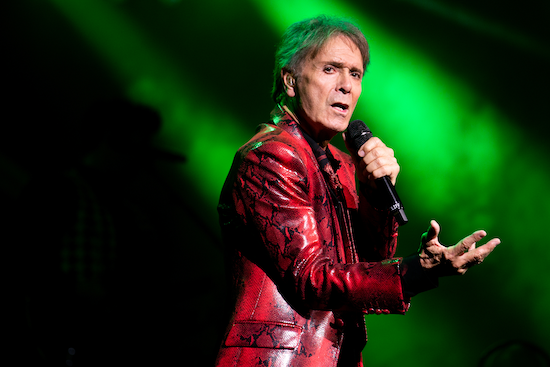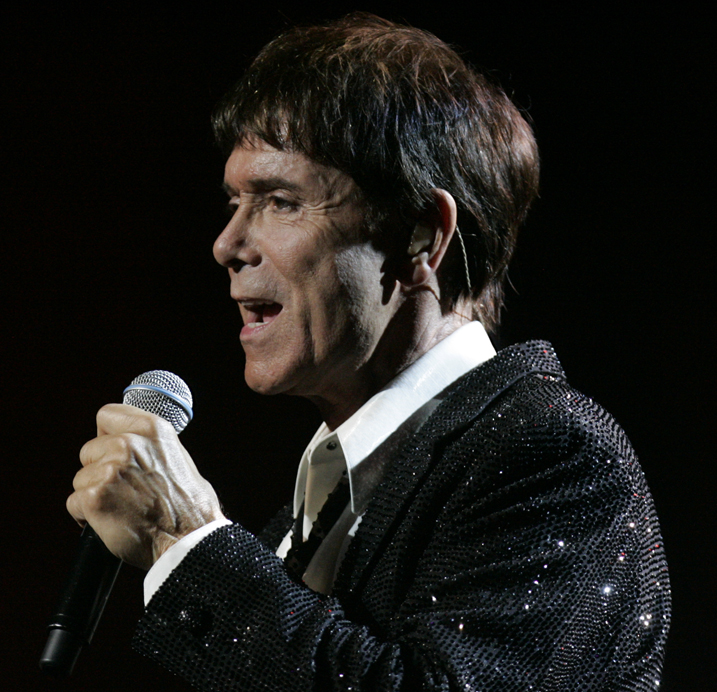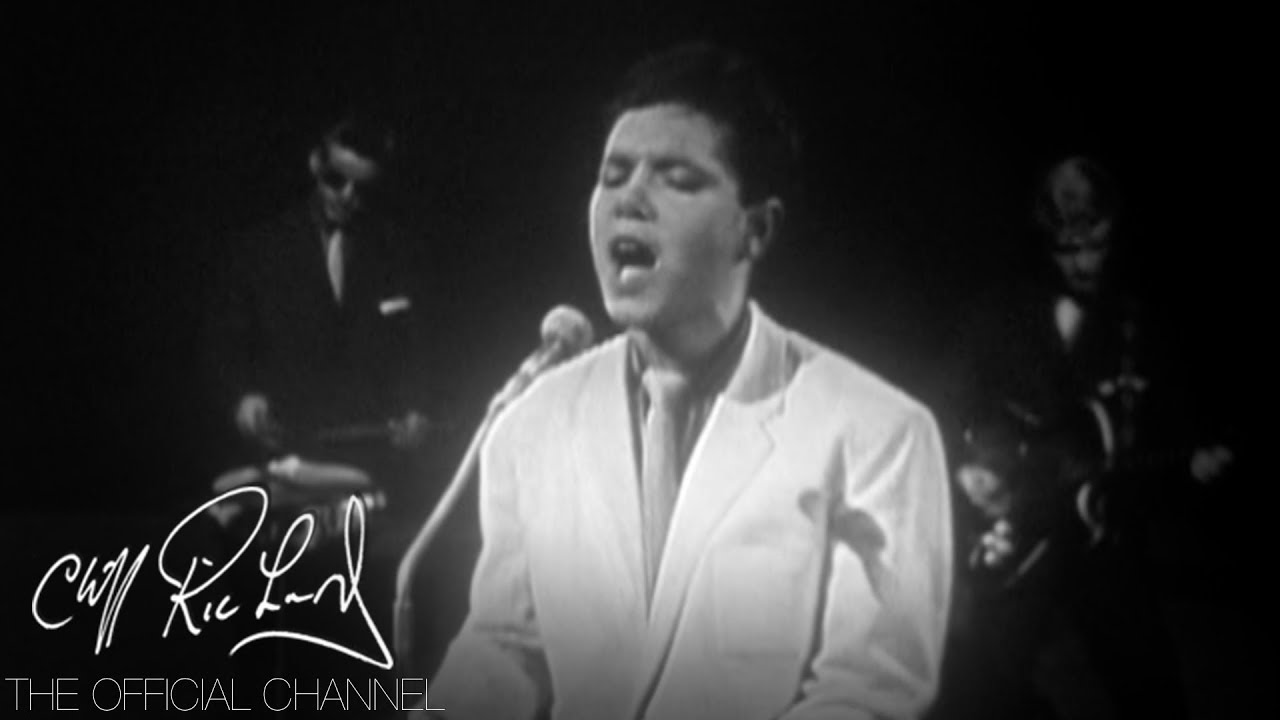Underneath the Hammersmith Flyover, parked in single file down a busy street and flanked outside the Apollo, there are coaches booked in package deals from Essex towns. Clacton and Colchester, Chelmsford and Brentwood, Benfleet and Thurrock. Tonight we may be geographically in London, but psychically we are somewhere altogether different. Whilst the concert is in the capital, its audience more closely resembles parts of the UK popular with people of retirement age. Cliff Richard: The Blue Sapphire Tour is a short run of dates – six nights here with stop offs at Blackpool and Glasgow – to mark 65 years of the singer’s recording career.
When taken seriously as a musical figure, rather than just a celebrity or curio, Richard’s musical reputation rests on what he achieved in the white hot aftermath of his first single ‘Move It’, and in the 21st century he has been rightly reappraised as perhaps the most important early British rock and roller. But what has he been for the rest of the time? A contrarian take makes sense – straight edge pioneer, outsider artist and queer icon all at once – but I don’t know if this gets to the truth of an artist whose singles chart success is eclipsed only by Elvis and The Beatles. He remains pop’s longest serving enigma, whose central mysteries only become more oblique as his historical context disappears.
When Richard takes to the stage, it’s for a spirited rendition of ‘The Young Ones’. Dressed in a dark glitter shirt tucked into leather-effect trousers and glitter trainers, Richard moves with an energy that lays waste to his 83 years. Performing with a six piece band, the minimal staging is classy and free of video screen. Up in the cheap seats, the audience are amiable without being easy. They need to be won over, unlike the front few rows who sway and wave tinsel from the off. During early hits like the prophetic, waltzing ‘Bachelor Boy’ or the utterly icky ‘Living Doll’, Richard sings flanked by guitarists, performing the neatly coordinated side steps that were the signature of The Shadows, designed to send the pop kids of the late 1950s and early 60s insane. But hysteria and heightened emotion is not the mood of tonight, which instead sustains a careful temper of chaste bonhomie. The single most important thing to understand about this show is that, where for other performers the introduction of a prized hit might traditionally elicit cheers, here the sound the audience makes time and time again is the bright cooing sound that people make over cute images of young children or the recollection of a treasured memory.
This is a period of heightened activity for the singer. The recently released album Cliff With Strings, with its almost jaw-droppingly literal artwork, came a week after his book A Headful Of Music, a personal journey through Richards’ favourite songs (including his own) with an engaging foreword by Saint Etienne founder and music journalist Bob Stanley. The Blue Sapphire tour will also be broadcast into cinemas across the UK later this month. Because of that, on this tour Richard is doing things a little differently. He is joined on stage by Iain Dale, the conservative LBC broadcaster and political book publisher, who leads him in a sit-down chat pitched somewhere between end of the pier revue and one of the chummier celebrity podcasts. “Your voice has actually got stronger with age, not weaker,” posits Dale, framing this as if it’s a question. In its only reference of the night, a question about Elton John leads Richard to refer to what he terms “my terrible time with the BBC.” This is greeted by an overwhelming chorus of boos. “Elton called me,” says Richard, “and I can’t repeat what he said.” Then, he does: “take them by the throat.” In 2014, Richard’s home was raided by police over a sexual abuse claim. He was never arrested or charged and the case was discontinued by the Crown Prosecution Service on the grounds of insufficient evidence, which was upheld under review. The BBC was criticised for its coverage of the incident. Speaking to the House Of Lords, Richard said that he will be “forever tainted” by the accusations and that he will never regain the respect and confidence lost by the investigation. Richard left the UK, and now – as well as the Barbados home where he has hosted the likes of Tony Blair and Captain Tom Moore – his main residence is in New York, where he enjoys luxury and relative anonymity on the Upper East Side. “I walk around everywhere, I do my own shopping,” says Richard tonight. He tells Dale a joke about being mistaken for Keith Richards, which he has been telling a version of for longer than I have been alive. The format mostly works, and the audience are hushed and engaged to hear The Cliff Richard Story as he tells it.
The problem with The Cliff Richard Story, though, is that it’s usually him doing the telling. Richard’s life is also fascinating in ways that he tends not to want to reckon with, or at the very least downplay. He was born Harry Rodger Webb in 1940 in Lucknow in northern India, which was at the time part of the British Empire. The Webbs – as historian Andrew Hickey details in his A History of Rock in 500 Songs podcast episode on Richard – were a fairly standard British family in India, which is to say that they enjoyed the benefits of exploitation, living in luxury and and using servant labour. After the partition of India in 1947, their position newly unsustainable, the Webbs relocated to the United Kingdom, moving from luxury to a cramped single room in a three bedroom house in Surrey. With his dark complexion and Anglo-Indian accent, the young Webb was ridiculed and abused by other children who thought him Indian born. How might the immediate and shocking loss of status have affected the boy? The Webbs were saved by the welfare state when the family were moved into a council flat in Cheshunt in 1950. Walk around there today, and between the overground station and Cheshunt Park is Cliff Richard Court, a retirement estate.
Though the band tonight run the gamut from thrusting early rock and roll to widescreen MOR pop, it’s a performance of ‘Move It’ that feels separate and distinct. The younger of his two guitarists, with a long swooping fringe, does a remarkable job of capturing the tinny crystalline slap of the early Sun recordings that the single was designed to imitate. Richard seems to feel the same, facing the band as it ends and saying that – even now, 65 years since its release – he still thinks it’s a great rock and roll song. The whole concept of Cliff Richard is bound up in ‘Move It’. The single most important moment of his career was his first performance of the song, as well as ‘High Class Baby’, on the TV programme Oh Boy, the Saturday evening show, which ran across 1958 and 59, provided a crucial going overground moment for rock and roll in the UK.
Jack Good, the visionary and charismatic TV impresario behind Oh Boy, used techniques he had picked up from Shakespearean productions and pop psychology to create a dramatic visual language for pop, whose influence can be felt in almost all televised music performance today. He worked extensively with Richard before the performance, dictating every hand movement and step. “Unless he permitted it, you couldn’t do it,” said Richard in a 2008 interview, “I’ve said many times that it was Jack who created the beginnings of Cliff Richard.”
That’s a funny way to talk about your own name and identity. The eighteen-year-old had already adopted his stage name, but you can imagine during those rehearsals – as Jack Good moulded and sculpted a pop star from almost nothing – that Harry Webb just transcended to the same strange limbo where resides Paul Hewson, Stefani Germanotta or Robert Zimmerman. Tonight, Richard’s repertoire of wiggles, claps, thrusts and steps have deviated only a little from that 1958 performance. The vaulting distance between its original context and now also provides no small element of camp during the performance; there’s a lot of hands and hips. Sometimes this is fulsome enough to warrant a round of applause, and I am surprised to find myself clapping when the singer completes a slow motion pirouette.
One song is introduced as being recorded at EMI studios. “Now we all know about Abbey Road,” jokes Richard, “because The Beatles keep bleating on about it.” There are small pockets of pantomime boos across the auditorium. “And that’s because we bleated on about it! Everyone thinks that The Beatles owned Abbey Road, but I rented it to them.” Cliff’s antipathy towards The Beatles has become a theme of his late public appearances, like last year’s Cliff At Christmas BBC special which involved the singer making those same points whilst interviewed by Sarah Cox at Abbey Road Studios, or last week on BBC Breakfast where he chided the band for their use of “artificial insemination” to record ‘Now And Then’. Why? The Beatles, as they broke nationally in 1963, were a punkish rejection of the showbizzy orthodoxies that – by that point – Richard represented more than most. John Lennon’s quote that “before [‘Move It’] there had been nothing, just nothing at all” is well documented, but we have all fallen in love with the shock and promise of a debut single only to quickly cringe at what the act gestates into. “We’ve always hated him,” said John Lennon in 1963, “he was everything we hated in pop.” The first piece of journalism about The Beatles, by Bob Wooler in 1961, contrasts them to a rock and roll scene that “had been emasculated by figures like Cliff Richard.” Lennon understood this. “Every group had a lead singer in a pink jacket singing Cliff Richard-type songs,” he said in another interview, “we were the only group that didn’t.”
Though Cliff Richard was able to find remarkable success in every decade until the millennium with only subtle degrees of reinvention, I’m not sure his public image ever won back what was lost in 1963. Not, though, that it matters to this audience. Apart from a lone rockabilly couple in their 30s, the audience appears to be staunchly the generation who lived through that decade. “The thing about Cliff is,” explains an old boy from Canvey Island who I chat with during the half-time interval, “he’s a very likeable guy.” And this is true. On stage, Richard is a parody of politeness. Generous and self-deprecating, he is the only singer I have ever seen credit the songwriter of almost every track during the show.

Of course, Richard’s defining late period hit was a co-write with the Gospels: ‘The Millennium Prayer.’ English pop music has traditionally had far less of a relationship with religion than that of the US, but Richard’s Christmas hits serve as outliers for their Middle England spiritual status. For Richard’s audience, those values are explicitly part of his appeal. “Middle England wants something that’s theirs that’s not afraid to say that we’re a country that comes with a Christian background. Something spiritual,” explained Richard in 1999. Middle England is one of those terms that sounds as though it has been around forever, but was in fact popularly introduced by Margaret Thatcher as an approximation of Richard Nixon’s silent majority. Richard tonight reminds us that the song’s genesis was as part of a campaign for the Marks And Spencer charity Children’s Promise. EMI wouldn’t release it. Richard took it to an independent label, but DJs wouldn’t play it. Richard tonight recalls speaking to an unnamed northern DJ who refused to play the track. “I said to him, you are a servant of the people,” he smiles, “and this is what people want.” There is more booing. “We lost that battle. But you won it for those children that Marks and Spencer were catering for.” The song was number one for three weeks in 1999.
Richard flatters his audience by telling them that he chose the early November booking so that he could be the very first to wish them a happy Christmas. This means ‘Mistletoe And Wine’, the Thatcher-era schlager which began life as a socialist pub chant in a forgotten 1976 musical. Richard sheared the song of its class war undertones, turned it into Middle England gospel and created a festive standard. There’s also ‘Saviour’s Day’, which is unexpectedly rousing; all big 80s gated drums, rhythms you can just about sway to, and its pan pipe riff conjuring the vague and unexpected folkishness you might associate with a butter advert. Its lyrics conjure a festive idyll of young people returning home from the big cities to raise their glasses with the elderly. Where the big, enduring 1970s Christmas singles were stomping singalongs for Christmas Eve last orders, Richard’s offerings are surprisingly gentlemanly homilies to restrained cheer.
There’s also time for another festive tradition: the remembrance of absent friends. “People have to die,” says Richard, during some unusually morbid stage patter. “We all have to die. But if we have people like Olivia Newton-John, you know, they never really die.” There is huge applause, and the introduction of mortality is unusually poignant in this older audience.
65 years ago, when Cliff Richard’s recording career began, the mid 20th century baby boom meant that his pop records had a new and ready audience of young people, suddenly economically buoyant with flexible production-line employment and given stability by the new peace. Now, for the first time in the UK, last year’s census showed that there were more over 65s in the UK than there are children. One in five people in England and Wales are over Blue Sapphire age. Some of this can feel visible in the culture: there is a new Beatles song at the top of the charts, a new Rolling Stones album on the shelves and a Martin Scorsese movie in the cinemas. Speaking to Dale, Richard still talks as though he’s at the start of a twenty-year plan, and talks warmly about changes in BBC policy that are beginning to mean airplay for people like him or Elton John in their autumn years. There is a moment of real showbiz drama when Iain Dale reads out the freshly announced UK album charts live on stage. Cliff With Strings? In at number five. Cliff Richard has now had top five albums in eight consecutive decades. The singer is pleased, to be sure, but he looks as though he is already plotting the next two: even suggesting his willingness to work with Taylor Swift and “rappers” to finally break America.

Creativity arriving at any point in life should be welcomed and encouraged, but tonight, pop’s cult of youth is oddly more present at a Cliff Richard concert than it ought to be. His impish performance of teenagerdom can land as a kind of arrested development. On stage, Richard tells us that he works hard to ensure each track sounds like the album. Which it does, often with searing precision as on a terrific ‘Wired For Sound’, a song where a noted sexual ambivalence comes a distant second to the ecstatic potentials of cables, wires, car radios, small speakers and tall speakers – yet there is an avoidance of late style. There is no Blackstar for Sir Cliff.
Unexpectedly, the show’s sole moment of high drama comes during the encore, when the front six or seven rows simultaneously – what signal did they hear? – stand up and rush to the edge of the stage. Many are waving small flags, generally of Commonwealth nations like Canada or Australia. “I don’t like the word love,” says Richard – Middle England isn’t big on hugs and kisses – “but that’s what I feel here tonight.” He says that he and his audience have always been a team. “To me, that’s second only to the knighthood.” When the show does end, instead of the usual bottleneck into Hammersmith underground it’s orderly meeting points for the coach drive home.
As I leave, it is hard to comprehend the 65 years summed up in tonight’s show. Such is the singer’s tight proximity to the second Elizabethan age, we won’t really know the Queen is dead – that we definitely have left the 20th century – until the Cliff Richard era passes.
Cliff Richard’s new album Cliff With Strings – My Kinda Life is out now via Rhino. The Blue Sapphire Tour will be screened in UK cinemas on November 25 and 26



